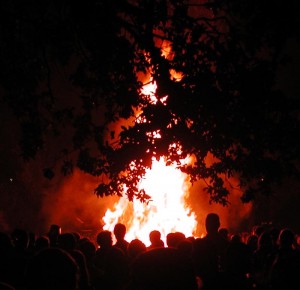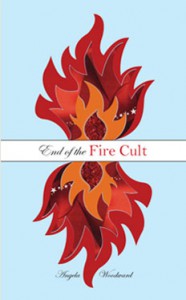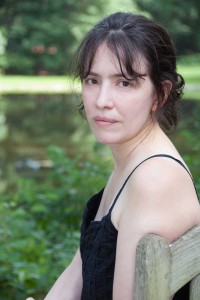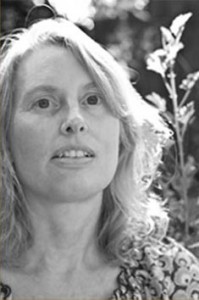 With the first two sentences of her novel End of the Fire Cult (Ravenna Press, 2010), Angela Woodward offers a glimpse of a fictional world both inviting and mysterious: “Three years ago my husband gave me two-thirds of an exceptionally beautiful and sacred mountain. I disputed whether he owned it in the first place, but I accepted through treaty his offer of the majority portion.”
With the first two sentences of her novel End of the Fire Cult (Ravenna Press, 2010), Angela Woodward offers a glimpse of a fictional world both inviting and mysterious: “Three years ago my husband gave me two-thirds of an exceptionally beautiful and sacred mountain. I disputed whether he owned it in the first place, but I accepted through treaty his offer of the majority portion.”
What follows in this strikingly unusual novel is a further revealing of that sacred mountain and the two imaginary countries that border it, Marmoral (invented by the wife) and Belgrave (invented by the husband). Trouble is headed the couple’s way, played out on the unexpected stage of an interior geography. Matt Bell, in his review of End of the Fire Cult, observes that the novel “manages to render the sometimes-hard-to-see strains of a marriage not by zooming in on their smallest details, but by casting their essences across the history of a mutually-invented world. In doing so she makes the wife’s sadness and her longing into something of a small epic, one as moving as it is inventive, as heartbreaking as it is gorgeous.”
Angela Woodward is also the author of the collection The Human Mind (Ravenna Press, 2007). Her work has been nominated for the Pushcart Prize and the Best of the Midwest anthologies, and has appeared in Gulf Coast, Ninth Letter, Camera Obscura, Storm Cellar Quarterly, and Dzanc Books’ Best of the Web 2010 anthology. She has won awards from the Illinois Arts Council and the Council for Wisconsin Writers, and in 2011 she was awarded an Emerging Writers Fellowship from The Writers Center in Bethesda, Maryland.
Interview:
Philip Graham: The premise of your short novel, End of the Fire Cult, is so original—a wife and her husband invent a set of competing, virtual countries that increasingly reflect their dissolving marriage—that I have to first ask, Where did the lightning strike of the book come from?
Angela Woodward: A lot of people have asked me this sort of question, and it baffles me, because to me this premise is so deep in my thinking about relationships—of course marriage is the intersection of two imagined countries and their conflicting cultures. What else could it be? A student from China told me about a sacred mountain that straddles a border—I think with Korea—and the holiday that both countries claim as theirs. This was the inspiration for the first chapter of Fire Cult, and I guess it seemed to encapsulate perfectly my long-simmering image of marriage. You can give each other mountains, and holidays, and origination myths, and also take all those things away, or rewrite what they mean in your joint understanding. It’s marriage as colonialism, but I’m not reaching for that, trying to make it fit. It was always that for me.

I’m not so sure you should be that baffled. I think most people, if not all, would agree with the idea that a married couple can resemble the conflicting cultures of two countries. What is so striking about your novel, however, is how you develop that notion. The wife—and narrator—of Fire Cult invents a country, Marmoral, and her husband creates his own, Belgrave, and what then proceeds is a sort of internal wrestling match between the couple, an unfolding conjugal diplomatic crisis.
Maybe what you’re getting at is that Fire Cult is inverted, or inside-out. Nothing is more common in literature than a story of lovers finding each other or disentangling from each other, and there’s infinite variation in the stories of getting together and falling apart. Usually we tell these stories through character, trying to convey individual feelings, to show what’s unique about a particular couple’s very common situation. Fire Cult goes at this common situation by making the emotional interiority exterior. She’s invented her country, and he’s invented his, as well as the third country that threatens to invade them. Almost all the interplay between the narrator and her husband, Daniel, is expressed through what happens in Marmoral and Belgrave. We get hardly any of their conversations and interactions in the real world.
“Making the emotional interiority exterior,” I like that. It reminds me of why, during my second stint as the fiction editor of Ninth Letter, when you sent us some initial sections of your novel, we all were immediately drawn to the work, especially the subtext of the details of Marmoral and Belgrave. These two countries are deeply strange, and the source of that strangeness drew our curiosity. We kept asking to see additional excerpts, and slowly we came to understand how much the mainly unspoken domestic drama was embodied in the seemingly ethnographic details of the two invented cultures.
It’s a slow unfolding, and pretty indirect, too. In Marmoral’s fire festival, people make bonfires and watch for the smoke to blow in either a lucky or unlucky direction. The husband’s country, however, has evolved its fire ritual into a film festival that attracts critics from France and Australia. Belgrave’s film festival is modern and posh, and supports a special effects industry known for gruesomely life-like portrayals of violence. We don’t see the wife or Daniel in either of these chapters. They’re entirely set within the two imaginary countries. But we’re getting a sense of her as a bit passive and hopeful, and him as more overt and successful. That’s a little too simple. You can’t map the countries’ cultures directly onto their creators.
That’s something else I love about your novel, that there’s no direct correspondence. In some ways, End of the Fire Cult reminds me of Haruki Murakami’s Hard-Boiled Wonderland & the End of the World. His novel alternates two narratives, one an off-kilter contemporary Tokyo and the other a walled-in, dream-like town. The two parts seem to have no connection, but slowly, details in one narrative seem to echo details in the other, and a careful reader begins to fit the two worlds together. A certain mystery remains, though, and that’s especially true of your novel. If A equaled B in Fire Cult, the book would simply be a puzzle to be solved. But what certain aspects of Marmoral represent for the wife isn’t clear, and so her character evokes the bracing opacity of a real person. The same goes for Daniel, her husband.
I’m using a more groping, ethnographic unveiling of culture for what might ordinarily be character development. The emotional tension of the novel lies in what happens between the two of them as the relationship falters. That would be the core of a more conventional novel, too. But you have to piece it together through these episodes about each country’s literature and architecture and religious rituals.
And those details are so wonderfully imagined, such as Daniel’s description of certain aspects of the Belgravian language:
When a black thunderstorm passes in late afternoon so that the sky plunges into darkness and after half an hour clears up, and the evening is then lighter than five o’clock so that time seems to be going backwards, well, we don’t have a word for that. We could simply stand on the porch and look out, no one saying anything. That is really best.
Reading Fire Cult, I was often completely convinced of its world, so lovingly described, and had to remind myself that I was actually reading the wife’s—or Daniel’s—inner life.
But it is the world, or a world, isn’t it? If I’m describing a place I’ve been, or a place I’ve imagined, or a place a person I’ve imagined has imagined, I’ve got the same partial means to do that. I mean words, which are so desperately incomplete. You fill in from what you read. I’m just giving you a little bit of scenery, and you imagine the completeness behind it. All our understandings are based on this making a whole out of little traces. You imagine you know a person based on these tiny things. The wife says she used to light up at hearing his footsteps on the stairs—she read into that sound his confidence and sureness, which maybe meant a lot of other things about what he was to her.
Absolutely, and that reminds me of this lovely sequence about Marmoral’s fireflies:
For the short period the fireflies came out, the members of the fire cult stayed up all night, evading official curfew, and walked around the orchards. The dark trees flashed, leaves suddenly visible, then shrank back to murky umbrellas as the bugs’ torsos shut down. Your lover’s face swung into focus, the phosphorescence behind her haloing her cheek. Then a moment later she was extinguished, just a black figure beside you. Yet you still heard her breathing, regular and steady.
Seeing, and not seeing, and yet still being aware of a breathing presence, this seems emblematic of a reader’s experience of your novel’s balance of inner and outer.
In one of the “Words” chapters, a man is listening to his lover clip her nails, which sounds just like the crickets outside, and it’s this sense of nature and domesticity combined—that’s one of the Marmoral sections too. We think we know Marmoral, because we know their poetry. And we know her, the wife, just as well, or just as little, from the same little snippet.
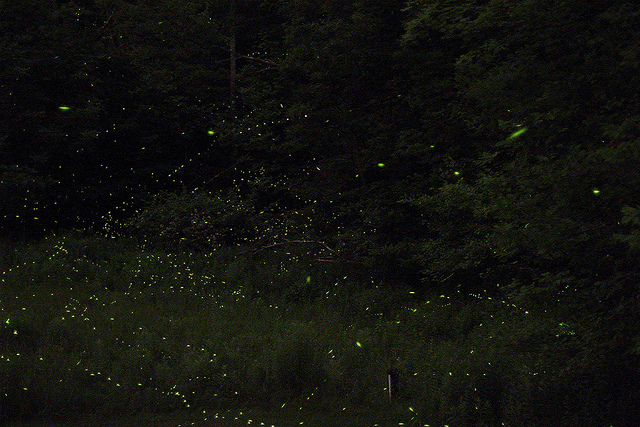 There’s a strong feeling of the uncanny while reading End of the Fire Cult, at least for me. The worlds of Marmoral and Belgrave, with their rituals and folklore and politics, draw me in, with each physical detail echoing some hidden psychological counterpart. And yet your prose is so clear and fluid that narrative energy is never lost.
There’s a strong feeling of the uncanny while reading End of the Fire Cult, at least for me. The worlds of Marmoral and Belgrave, with their rituals and folklore and politics, draw me in, with each physical detail echoing some hidden psychological counterpart. And yet your prose is so clear and fluid that narrative energy is never lost.
I think the uncanny is the sense of the unseen hovering around the seen. Though in Fire Cult the ratio might be reversed, and we have a lot of what ought to be invisible—the imagined worlds—in a sense blotting out what’s more usually visible, there is that sense of all the detail registering in multiple dimensions.
Yes, that ratio reversal is a key, I think, to your book’s originality. It’s a short book that seems longer, as it’s so multi-layered and open to different readings. It’s also filled with odd and intriguing narratives, such as the Belgravian journalist who travels to Marmoral to write a touristic puff piece on local customs and finds himself in an area replete with werewolves. It’s an eerie story, and yet also filled with these captivating, pseudo-ethnographic details:
The little villages in the pine forests locked themselves up tight at night. The woman’s first duty in the morning was to sweep the yard free of animal tracks, because if the dew filled a werewolf’s footprint, and by some accident the liquid touched human skin, a new werewolf was created.
Because the novel is overall a sad story, a break-up story, I tried to balance that with a lot of playfulness. Belgrave is always somehow better than Marmoral, and in one chapter a Belgravian architect tries to win a world architecture prize. The competing buildings get more and more fanciful—finally, a house made of frog skins, lined with moss, which floats in a glacial lake. But the Belgravian trumps them all with a giant ball of tar. In another, a Marmolian librarian writes a spectacularly inaccurate dictionary. For various reasons, students want to liberate the words from the dictionary and attack the library by night. They can’t take care of the words they’ve rescued, and the words shrivel and die. I had a lot of fluidity to take the investigation of the cultures into these surreal crannies.
There’s also the haunting story of Arachne, the most popular prostitute in a brothel in the capital of Belgrave, who is half woman, half spider, or the Marmolian magician and his encounter with the Belgravian widow who longs for one last look at her husband’s face. These stories stand on their own, and yet they deepen as codes that offer to reveal the wife or husband who tells them.
Fire Cult has a shared project with my first book, The Human Mind, which is somehow to move the mind into the heart. We make this distinction, that the heart feels and the mind thinks, but I’m interested in a richly thinking emotionality. The Human Mind is a set of prose poems about thought that gets there through bees and weavers and phosphorus and diving bells. Fire Cult seems to go off in all these crazy directions, but it’s not an intellectual exercise. The emotional undercurrent is meant to carry it along.
Near the end of the novel, the curtain is drawn open a little more on the daily domestic life of the couple, and the memories of their beginning relationship. One passage in particular made me interpret the book I’d been reading quite differently. The narrator and Daniel are making love for the first time, an act she describes as “entirely and urgently mutual.” Yet this act of intimacy changes midstream when he insists, “Let me in,” which seems more than a physical request. Suddenly what they were doing together changes into something he’s doing to her, a different experience. She says:
I was only dimly aware at that point of how much farther in there was to me, to both of us, and what I would do to get away, to keep him out.
The man, by demanding too much, leads the woman to realize the vastness of her interior life and the need to protect it. In many ways, this passage seems to me to be the birth of Marmoral, and by extension, Daniel’s response to her imaginary country by inventing the more aggressive culture of Belgrave. The novel then transformed for me into an elaborate chase scene, the husband asking too much emotionally and the wife insisting on a certain essential privacy. Of course, their relationship is far more complicated than that, yet it’s one of the many ways to read your novel.
I agree, you could see her whole fantasy is in reaction to his pursuit of her. But it could have gone a different way. She’s determined to make that boundary, to keep him out. The “entirely and urgently mutual” enterprise is gone before it even started. It’s chilling, isn’t it?
Links & Resources
- Read Matt Bell’s review of End of the Fire Cult.
- Watch Angela Woodward’s Emerging Writers Fellowship Reading for End of the Fire Cult.
- Visit Angela Woodward’s website for news and upcoming events.
- Read an excerpt from End of the Fire Cult, which has just been published at Numéro Cinq in their April issue!

